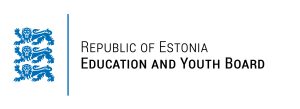Multicultural Summer School
Project period: 1.06 – 30.09.2021
The main goal of the project was to offer time and space to students from TKG, Suvemäe and other schools, aged between 11 and 13 years old to live together in nature, to discuss about different cultures – forest, sea, outdoor, Estonian, Russian, etc, to learn in a practical way and to acquire new skills in domains as arts, nature, communication, mental health and wellbeing, practical skills and knowledge of school subjects, etc.
The project was implemented with the financial support of the Youth and Education Department – Harno.

Loe veel
Main activities were dedicated to
- communication and socialization with young people with different mother tongue, Russian and Estonian and different cultural/national background;
- exploration of various cultures such as the culture of communication, culture of spending time in nature, culture of historical places, culture of food, French culture, culture of respect to nature, etc;
- mental health and personal development, as young people were forced to study online which affected their mental wellbeing at a great extent. This is also proved by our internal questionnaires organized by sections from our school;
- living in nature, camping and learning how to install and organize a camping place starting from zero;
- applying in practice and discovering new knowledge about topics studied in the framework of various school subjects, such as history and geography by living at the Baltic Sea, observing the Baltic sea life, the forest nature, the history of surroundings, etc;
- learning about nature, natural resources, climate and recycling, need to and how to take care of the nature;
- developing creativity by the means of art – young people will draw, paint while being in a natural landscape under the guidance of our art teachers;
- the need to be away from online environment in order to reconnect and to explore the offline methods of entertaining, away from computer games, etc.
Our participants have actively taken part in all the activities described in the attached program. We travelled together to Rakvere and then to the venue. Before arriving to Pehka küla, we have visited the Kunda tsemendimuuseum where the guide told us about the Kunda history, the French man who ha considerably influenced the culture of the city. Afterwards young people participated in a poetry contest next to the sea side. Then we have visited the ruins of Tolse castle not far from Kunda and we have discussed the history of the castle.
Together they installed the camping site – the tents. They decided who with whom will share the tent. The students who had not tents and/or sleeping bags, were offered one.
The day continued with reflecting on the activities of that days and the program that will follow. A carrot contest was organized. The evening bonfire was the place where everyone gathered to get to know each other using name games. In the end they had sauna that they heated by themselves. Sauna culture in Estonia was discussed.
Next day was dedicated to forest culture – we had a long walk in the forest, despite the rain. We analysed plants, trees and we picked up mushrooms. We looked for animal traces. The biology, hiking and orientation skills were actively used. Then we had a late lunch at a local, old pub where we did the reflections. Back to the venue, a mushroom exhibition was organized and a Quizz. The winners got sun dried apples – a sign of healthy snack.
Days 3 and 4 were dedicated to the history and culture of Rakvere. We have visited the Linnus fortress were we had a guided tour. Then the students spent time discovering the fortress life. The day continued with the visit to the Police museum. The work continued on analysing the actual youth meeting and discussing the future plans. We discussed the Noortekohtumised program and we made plans to elaborate new projects. We have evaluated the activity using the discussions in groups and reflections, at the light of the bonfire, while eating baked potatoes.

